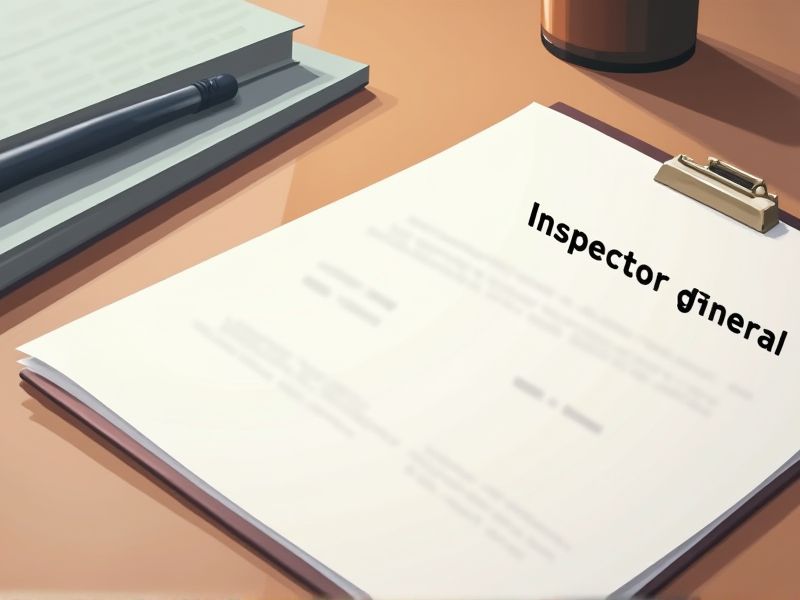
The role of Inspector General often requires thorough oversight of complex organizational processes, necessitating a deep understanding of legal and regulatory frameworks. Certifications demonstrate an individual's commitment to maintaining high ethical standards and proficiency in investigative techniques. Much of the work involves analyzing intricate data and identifying irregularities, requiring advanced skills validated by specific credentials. Key certifications for an Inspector General position may include these essential recognitions.
Certified Fraud Examiner (CFE)
The demand for a Certified Fraud Examiner (CFE) within an Inspector General's office arises because CFEs possess specialized expertise in detecting and preventing fraud. Their skills contribute to more effective audits and investigations, ensuring integrity in financial reporting and compliance. CFEs also enhance the capability of identifying vulnerabilities and implementing robust anti-fraud measures. By integrating CFEs, an Inspector General's team can improve accountability and safeguard organizational resources.
Certified Internal Auditor (CIA)
Certified Internal Auditors bring a specialized skill set in evaluating internal controls, which helps Inspectors General ensure efficient and compliant operations. The presence of a CIA aids in identifying financial discrepancies and risks, enhancing the overall integrity of audits. Having a CIA on board allows for more effective implementation of accountability frameworks, maintaining transparency within an organization. Their comprehensive knowledge of audit standards supports Inspectors General in delivering accurate and reliable assessments of internal processes.
Certified Government Auditing Professional (CGAP)
Organizations involved in governmental functions often face complex auditing requirements; the CGAP credential ensures that an inspector general possesses the specialized knowledge needed to address these challenges. Inspector generals are tasked with overseeing public funds and resources; obtaining the CGAP certification signifies expertise in the standards and practices crucial for maintaining accountability and transparency. Many governments set rigorous audit standards; the CGAP helps certified individuals stay current with these regulations, ensuring compliance. When inspector generals have CGAP certification, it signals professionalism and competence, which can strengthen public trust in governmental operations.
Certified Information Systems Auditor (CISA)
Organizations rely on Certified Information Systems Auditors (CISAs) to enhance cybersecurity measures, ensuring systems are secure and compliant with regulations. The expertise of a CISA supports Inspectors General by identifying vulnerabilities in information systems, thus minimizing data breaches. A CISA's proficiency in assessing the integrity of financial and operational information adds credibility to audits, leading to more informed decision-making. Their knowledge of industry standards and practices ensures audit processes align with the latest technological advancements and regulatory requirements.
Certified Risk Management Assurance (CRMA)
Certified Risk Management Assurance (CRMA) equips an Inspector General with advanced skills in risk management, enhancing their ability to identify and mitigate potential risks within organizations. Mastering CRMA principles enables thorough assessments of governance processes, leading to improved compliance and accountability. Possessing CRMA certification often signifies a commitment to upholding industry standards and can increase credibility in oversight functions. Comprehensive knowledge in risk assurance gained through CRMA supports informed decision-making, fostering a proactive rather than reactive approach to potential challenges.
Certified Compliance & Ethics Professional (CCEP)
Organizations increasingly require Certified Compliance & Ethics Professionals due to heightened regulatory scrutiny and complex legal standards. When an Inspector General holds the CCEP certification, their capability to identify and mitigate compliance risks significantly improves. The certification equips them with specialized knowledge in ethics and compliance, which strengthens internal control systems and integrity. Employing an Inspector General with a CCEP enhances organizational credibility and establishes a culture of accountability.
Certified Professional Investigator (CPI)
Certified Professional Investigators bring specialized skills and knowledge critical for conducting thorough investigations under the Inspector General's mandate. Their expertise ensures adherence to legal and ethical standards, reducing the risk of oversight or violations in complex cases. CPI professionals enhance the credibility of investigative findings, which supports transparency and accountability in governmental operations. Employing CPIs can lead to more efficient use of resources and result in higher-quality investigative outcomes.
Certified Forensic Accountant (CrFA)
A Certified Forensic Accountant (CrFA) aids an Inspector General by providing specialized expertise in detecting and analyzing financial fraud. Their presence enhances the integrity and transparency of financial audits within organizations. CrFAs bring credibility in complex investigations, ensuring accurate and reliable financial reporting. Their skills in forensic accounting are crucial for identifying money laundering, embezzlement, and other financial crimes.
Project Management Professional (PMP)
The Project Management Professional (PMP) certification provides inspectors general with a structured framework for effective planning, execution, and completion of complex projects, enhancing accountability and transparency. This certification ensures that inspectors general are equipped with the skills necessary to mitigate risks, crucial for maintaining integrity and compliance in investigations. With PMP training, inspectors general gain expertise in resource allocation and stakeholder communication, optimizing efficient use of government resources. The PMP credential reinforces credibility and trustworthiness, strengthening public confidence in oversight functions.
Certified Quality Auditor (CQA)
Certified Quality Auditors ensure adherence to established standards, directly impacting the credibility and effectiveness of the Inspector General's office. They identify discrepancies and weaknesses in processes, thus enabling the Inspector General to address potential issues before they escalate. Quality Auditors provide objective assessments, fostering transparency and accountability within the organization. Their expertise facilitates continuous improvement, enhancing the overall efficiency and reliability of the Inspector General's operations.
Summary
When you, as a reader, consider an Inspector General with certifications, anticipate enhanced accountability and transparency. Certification signifies rigorous training, which translates into more effective auditing and oversight. This improvement leads to better policy compliance within organizations. Trust in institutional processes is strengthened, benefiting all stakeholders.
